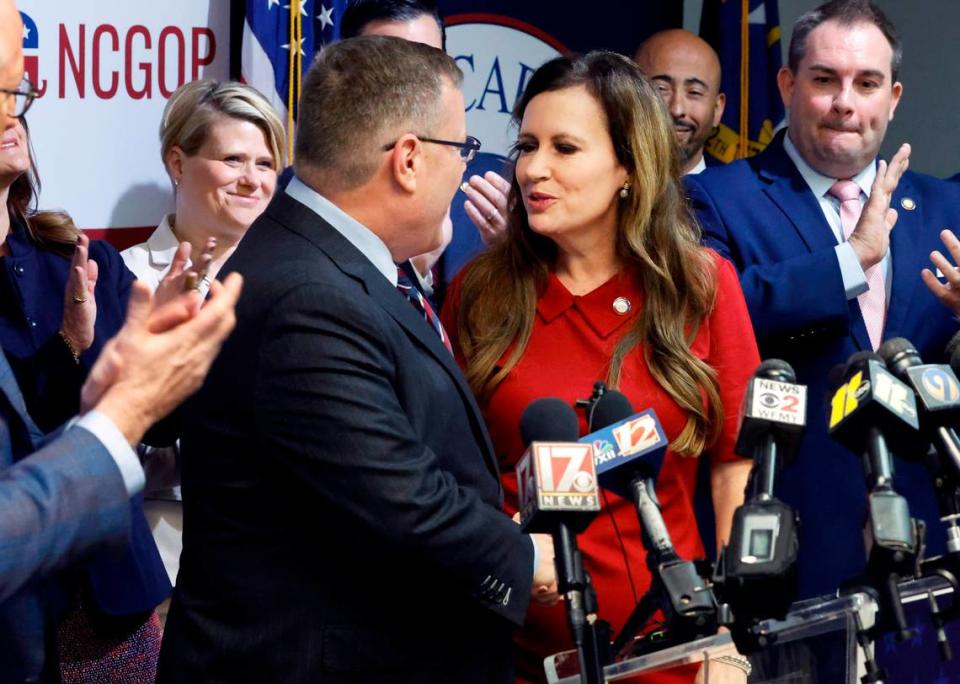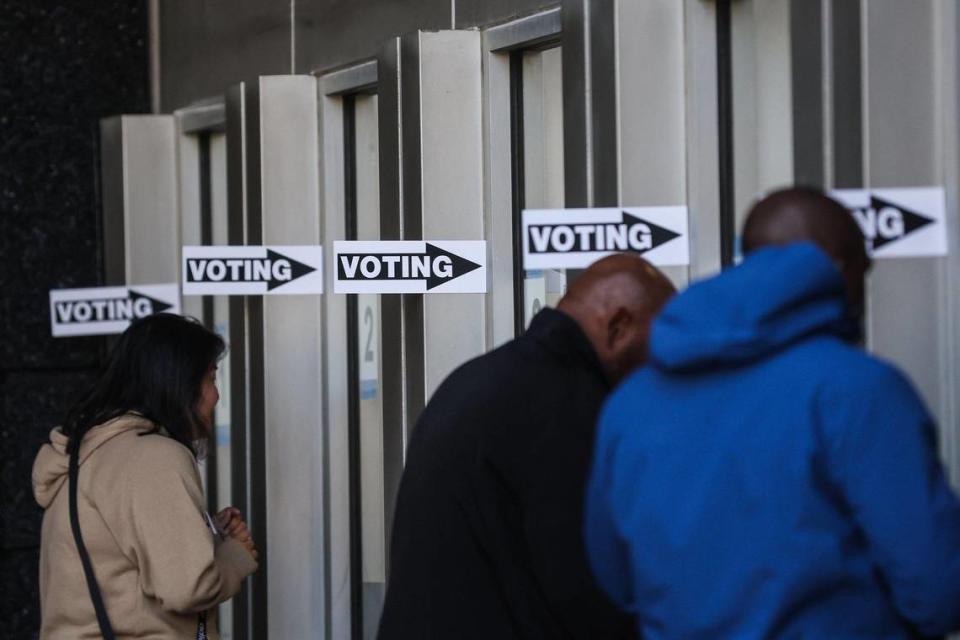What does NC Rep. Tricia Cotham stand for? Here’s what her voting history shows
- Oops!Something went wrong.Please try again later.
N.C. Rep. Tricia Cotham spoke clearly during an emotional 2015 debate about a bill to require women to wait three days before getting an abortion.
“My womb and my uterus are not up for your political grab,” said Cotham, then a Democratic representative for the 100th N.C. House District.
Seven years later, she again made her opinion known in response to a questionnaire from The Charlotte Observer. Cotham left the legislature in 2017 after an unsuccessful bid for Congress in 2016. She won the 112th House District seat in November as a registered Democrat.
“North Carolina should act now to codify Roe v. Wade to affirm the right to an abortion without interference,” Cotham wrote in 2022 when asked what the state should do if the landmark court ruling was overturned.
She also signed on as a co-sponsor in January of a bill to “codify Roe v. Wade” — prevent restrictions on abortion before fetal viability, unless the person’s life or health is in danger and stop any “undue burden” of the ability of a woman to choose.

But as she announced a party registration change on Wednesday, giving North Carolina Republicans a supermajority in the House, Cotham declined to commit to specific views on legislation. Cotham said she’s never thought abortion was “the biggest issue facing women in North Carolina” and said she would research bills before deciding.
“There’s a piece of good advice I learned a long time ago: Don’t discuss legislation that’s not before you. So, I’m not going to do that,” Cotham said Wednesday during a news conference in Raleigh.
Already a swing vote on some issues, Cotham’s stance could be decisive on abortion rights in North Carolina. The state currently bans abortion after 20 weeks of pregnancy, and Republicans are considering a 12-week ban. A total abortion ban introduced this year has just three sponsors or co-sponsors and hasn’t moved out of the House Rules Committee.
A gubernatorial veto override requires three-fifths of people present in the House at the time. That’s 72 votes with all members present, and Cotham’s switch makes 72 House Republicans.
Here’s where Cotham stands on other issues or when she has crossed party lines.
Immigration and sheriffs
Cotham voted last month with Republicans and two other Democrats in favor of House Bill 10. The bill passed the House 71-44, with two Democrats and three Republicans not voting.
It requires county sheriffs to comply with U.S. Immigration and Customs Enforcement when people are charged with certain felony and misdemeanor offenses and are the subject of immigration detainers, including holding them for at least 48 hours in jail. It would also require sheriffs and other jail administrators to notify ICE if they can’t determine the legal status of people charged with certain crimes.
The bill attracted opposition from N.C. sheriffs such as Mecklenburg County’s Garry McFadden, who previously told the Observer the bill takes away local law enforcement’s authority and that sheriffs already must cooperate with ICE.
Pistol permit repeal
Cotham was absent March 29 when the House voted to override Gov. Roy Cooper’s veto of Senate Bill 41, which eliminated the state’s pistol permit requirement. It also allowed concealed handguns in places of worship that are also schools.
Because she and two other Democrats missed the vote, Republicans succeeded in overriding Cooper’s veto with a 71-46 vote count. She said a scheduled medical appointment for long COVID was the reason for her absence.
She voted in February against a more narrowly tailored measure, House Bill 50, only containing the pistol permit repeal.
Charter schools
Prior to her party switch, Cotham maintained an outsized role for a Democrat in a Republican-controlled legislature as chair of the House K-12 Education Committee. She’s a former Charlotte-Mecklenburg Schools educator and served as vice chair of the House Education committee during her prior stint in the legislature.
She was one of three Democrats to vote with Republicans in favor of House Bill 149, which she also co-sponsored. The bill allows regional and statewide online-only charter schools, extends the state’s virtual charter school pilot program for one year and requires the state community college system’s president to be confirmed by the legislature.
WHO IS TRICIA COTHAM? New Republican has history of Demoratic politics
She’s the only Democrat to sign on as a co-sponsor of a charter school omnibus bill, HB 2019. The bill’s provisions include requiring the State Board of Education not to consider the impact on local public school districts when deciding when to approve a charter. It allows for the creation of a “micro school” within charter schools that could include specialized curriculum for a group of students. Another section of the bill allows counties to provide money to charter schools for capital improvements similar to local public school districts.
In her 2022 questionnaire, Cotham said she wanted to eliminate “high stakes tests” because the state puts too much weight on test scores.
Cotham also said in the questionnaire the state should fully fund the Leandro plan, which refers to court rulings that North Carolina has a constitutional obligation to give students access to a sound, basic education.
New rules for NC deaf and blind schools
Cotham voted last month with two other Democrats in favor of House Bill 11, which creates new boards to supervise the Eastern North Carolina School for the Deaf in Wilson, the North Carolina School for the Deaf in Morganton and the Governor Morehead School for the Blind in Raleigh.
Cooper allowed the bill to become law without his signature, saying it “unconstitutionally attacks the State Board of Education by putting partisan political appointees of the legislature in charge of our NC schools for the deaf and blind.”
@newsobserver North Carolima Democrats respond to Tricia Cotham’s party switch #triciacotham #ncdemocrats #ncpol #ncpolitics #ncga #nchouse #partyswitch ♬ original sound - The Raleigh News & Observer
Critical race theory
Cotham voted last month with Democrats against House Bill 187, a bill titled “equality in education,” but that critics such as Mecklenburg Democratic Rep. Laura Budd say would “micromanage from the General Assembly into the classrooms.”
The bill says that teachers shall not promote that anyone “should feel discomfort, guilt, anguish or any other form of psychological distress” based on their race or sex.
Partisan school boards

Last month, Cotham voted along party lines and with Democrats against House Bill 88, which would make a number of local school board races partisan. The bill made changes to school board elections in Ashe, Cabarrus, Henderson, McDowell and Mitchell counties. Now, in counties such as Cabarrus candidates will run according to what party they’re registered with.
Republican legislators argue the change gives voters more information. Opponents say it injects more national politics into local public schools.
In Guilford County, House Bill 88 also set a procedure for local political parties to fill school board vacancies. It also made changes to some small town elections.
TRICIA COTHAM'S MOM: Democratic county commissioner speak about daughter's change
Penalties for rioting
Cotham and a majority of Democrats voted in February against House Bill 40, which increases penalties for the crimes of rioting or inciting a riot. Six Democrats voted for the measure.
Gov. Roy Cooper let the bill become law without his signature, citing concerns about the First Amendment and “disparate impacts on communities of color.” The 75-43 vote count in the House would have been enough to override a veto.
House Bill 2
Cotham in 2016 voted against House Bill 2, which reversed a Charlotte ordinance that protected transgender people who use public restrooms based on their gender identity. It required people to use the bathroom in public facilities that matched the gender on their birth certificate.
“Don’t tell me this #HB2 is to save women and children. Disingenuous,” she wrote in a tweet at the time.
The N.C. General Assembly repealed the bill and approved a compromise measure after its passage resulted in nationwide backlash and economic losses for the state.

